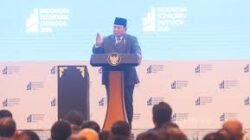Indonesiantalk.com — BPIP’s Stance on the Results of the 8th MUI Ijtima on Interfaith Greetings and Religious Holiday Wishes
Indonesia is a nation rich in the diversity of its ethnicities, religions, beliefs, races, and groups. This diversity is a treasure that we must preserve and protect together.
Interfaith tolerance is a key element in maintaining the unity and cohesion of the nation.
As a country founded on Pancasila, Indonesia must strengthen the spirit of tolerance and diversity, rather than undermining the pillars of unity.
The strength of Indonesia is reflected in the motto Bhinneka Tunggal Ika (Unity in Diversity), which has been a shield in maintaining the integrity of our national life since the time of our ancestors.
Tolerance, the spirit of pluralism, and religious harmony have been part of Indonesia’s cultural identity.
However, this rich diversity and existence of tolerance face challenges from religious community organizations (ormas) that attempt to build hegemony with a single interpretation concerning the prohibition of interfaith greetings and religious holiday wishes.
This is considered to have dimensions of worship and prayer.
The issuance of these ijtima results has the potential to damage the pluralism of society, considering that Indonesia consists of 714 ethnic groups with diverse religions and beliefs.
This coexistence has lasted for hundreds of years peacefully, so the state must not yield to ijtima results that lead to exclusivity in national and state life.
MUI, as a religious organization, must comply with Pancasila and the Law on Community Organizations, which mandates the obligation to maintain national unity and the integrity of the Unitary State of the Republic of Indonesia (NKRI).
The issuance of the MUI ijtima results on the prohibition of interfaith greetings and religious holiday wishes clearly negates the obligations of ormas as stipulated in Article 21 letter b of the Law on Community Organizations.
BPIP’s Stance and Recommendations
BPIP, as the state’s representative tasked with internalizing the values of Pancasila, has a role to ensure the unity and integrity of the nation are preserved, so that the existence of this country is not intervened by the dominance of any particular religious force.
Regarding this issue, BPIP responds as follows:
Theologically:
There is a difference between religion and religious thought, as well as between religion and religious interpretation. The ijtima results are religious thoughts that have a plural interpretation, not absolute, thus they do not possess a single, absolute truth.
The ijtima results must be formed from a broad perspective, including considering international documents and agreements such as The Amman Message, Marrakesh Declaration, Abu Dhabi Declaration, and the conclusions of the international seminar at Al-Azhar University.
Pancasila, as the highest consensus, has a level of Islamism that has been substantively tested. Pancasila is not dominated by any particular religious teachings but represents the substance of religious teachings.
Sociologically:
The ijtima results on the prohibition of interfaith greetings and religious holiday wishes threaten the existence of Pancasila and the unity of national life.
This tradition has become part of the local wisdom inherited for hundreds of years by our ancestors.
The integrity of the nation, which has lived in harmony for hundreds of years, should not be reduced by certain religious groups that have the potential to polarize, disharmonize, and disintegrate national unity.
Islamic Juridically:
The ijtima results are binding only internally within the Muslim community in Muslim religious forums, and therefore should not be enforced in public forums externally because they will reduce the values of unity and respect for national diversity.
Constitutionally:
Pancasila, as the highest legal basis, must make all policies subject to and refer to the values of Pancasila. Pancasila becomes the guideline in every formulation of legal products and policies concerning public interests.
Presence of the State and Role of Society:
The state and society must safeguard the existence of Pancasila in the public sphere to create equality for every citizen. Every Indonesian citizen is obligated to implement the Pancasila consensus, which in this case includes practicing tolerance and respecting differences within the framework of Bhinneka Tunggal Ika.
BPIP hopes that all elements of society can understand the importance of maintaining tolerance and diversity, and remain steadfast in preserving the unity and cohesion of the Indonesian nation.










